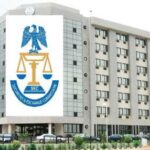Crowd take over court premises as Federal High Court hears Dame Jonathan’s fundamental human rights case
 The premises of the Federal High Court in Lagos was a carnival scene this morning at the hearing of the case on fundamental human rights filed by Dame Patience Jonathan, ex-First Lady, against the Economic and Financial Crime Commission (EFCC). While the case was ongoing inside the court a large company of pro-Mrs. Jonathan women besieged the court premises to protest the allegations of the EFCC against the former First Lady.
The premises of the Federal High Court in Lagos was a carnival scene this morning at the hearing of the case on fundamental human rights filed by Dame Patience Jonathan, ex-First Lady, against the Economic and Financial Crime Commission (EFCC). While the case was ongoing inside the court a large company of pro-Mrs. Jonathan women besieged the court premises to protest the allegations of the EFCC against the former First Lady.
Outside the courtroom, a large crowd of women came into the court premises brandishing placards and banners in support of Mrs. Jonathan. They said the former first lady was a victim of victimisation by the Buhari government.
The crowd defied security at the premises and remained in the court premises chanting solidarity songs.
Dame Patience Jonathan had filed a N200 million fundamental rights enforcement suit against Skye Bank Plc, following the freezing of four bank accounts, which she claims EFCC had used to inconvenience and embarrass her. All the accounts are domiciled with Skye Bank Plc.
Together, they are said to have a balance of $31.4m. The four companies are Pluto Property and Investment Company Limited; Seagate Property Development & Investment Co. Limited; Trans Ocean Property and Investment Company Limited and Development Company Limited and Globus Integrated Service Limited.
An affidavit filed before the court by one Sammie Somiari, a legal practitioner on behalf of Patience Jonathan, claims that the EFCC placed a No Debit Order on the four accounts in July in the course of probing one Waripamo Dudafa, a former Special Adviser on Domestic Affairs to former President Goodluck Jonathan.
After its investigations, EFCC went ahead to file an amended 17-count against Dudafa and seven others, including the four companies, with the defendants being accused of conspiring to conceal the monies which the EFCC claimed they ought to have known formed parts of the proceeds of an unlawful act.








